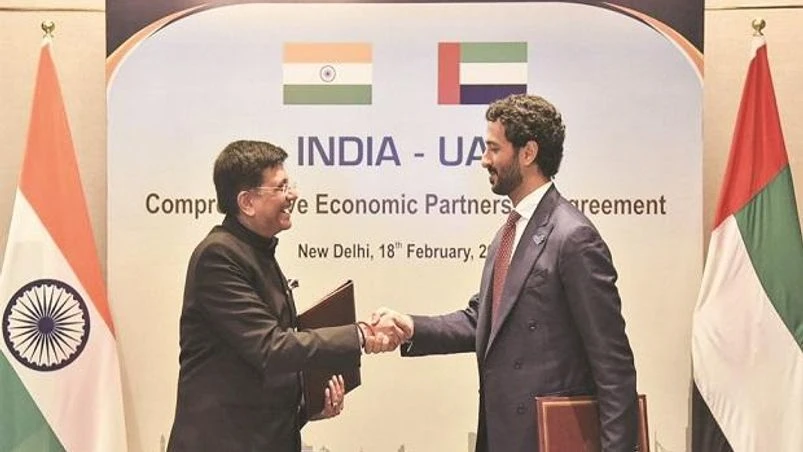 Can opening of procurement market to UAE firms lead to a tricky situation?
Can opening of procurement market to UAE firms lead to a tricky situation?
India has finally inked free-trade agreement with UAE. Delhi has extended 'national treatment' status to UAE firms in bidding for central govt tenders. Why has it raised concerns in several quarters?
Krishna Veera VanamaliBhaswar Kumar New Delhi
)
Piyush Goyal greets UAE minister Abdulla bin Touq Al Marri | Photo: Twitter
These include chapters on digital trade and intellectual property rights. But India seems to be effecting a significant change in its trade policy stance by opening its central government procurement market to the United Arab Emirates (UAE) after keeping the subject out of free trade agreements so far.
This will give national treatment status to UAE companies while bidding for central tenders, which means such companies will be treated on par with Indian companies for procurement.
Public procurement as a percentage of GDP is estimated to be about 20%. For a $3 trillion economy, this amounts to public procurement to the tune of $600 billion annually. Central public sector enterprises are a major contributor to the public procurement of works, goods and services.
In June 2020, the government barred global tenders from government procurement up to Rs 200 crore. Even for tenders above this threshold, the government can choose not to invite foreign suppliers.
The government won’t enjoy this discretion with UAE anymore. The clause however comes with its own limitations to safeguard the domestic industry.
Also Read
Public procurement of goods and services, including construction services above Rs 200 crore by 34 designated central government ministries, will be opened up.
However, procurements by all central public sector enterprises, autonomous bodies, and regulators are not covered under the deal. Procurements related to construction projects or any infrastructure projects, procurements relating to the health care sector, procurements of agricultural products for food aid programmes are also not covered under the deal.
Recognising the important contribution that MSMEs can make to economic growth and employment, the agreement allows both parties to apply a preferential procurement policy for their MSMEs.
What are the larger implications of India’s move?
Known for its cautious approach toward FTAs, India is currently in negotiations with the UK, Canada, Australia and the Gulf Cooperation Council. The government procurement clause in the deal with UAE could very well set a precedent and open the floodgates for similar demands from other nations in ongoing talks. India's existing free trade partners could also demand a review of the agreements. The move also sends confusing signals to local suppliers just as India is in the midst of the Atmanirbharta initiative to strengthen domestic manufacturing.
More From This Section
Don't miss the most important news and views of the day. Get them on our Telegram channel
First Published: Mar 30 2022 | 8:15 AM IST

